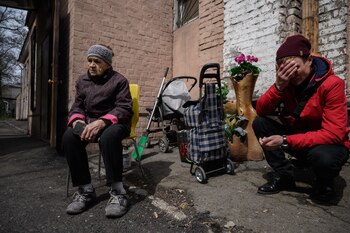
“On March 21, I left my house to smoke. A shell fell. I lost my arm.” Vladimir Lignov, 71, embodies the tragic fate of Ukrainian elders, invisible victims of the war that ravages their country.
The man, a former train driver, walks slowly in the corridor of a reception center in Dnipro, a city in central Ukraine that became one of the country's main humanitarian centers.

The left sleeve of her gray sweater is folded at the height of the armpit. He has a hard time explaining what happened to him. He does not know which war he is the victim of, nor who launched the projectile at Avdiivka, an industrial hub in the Donetsk region that Moscow has made one of its priorities.
“I don't understand what's going on. In a week I need to change my bandage at the hospital in Myrnohrad [in the middle of the conflict zone, where he was amputated]. But they tell me that I have to leave in three days”, he repeats time after time.
“Maybe it's better to go to the cemetery. I don't want to live anymore,” she sighs, as an old man limping and wearing a blue and red striped cap passes by her side.

Physical and mental suffering seems omnipresent among the elderly with whom AFP met at the Dnipró shelter, a maternity hospital that reopened in March to accommodate internally displaced persons on a temporary basis.

“Forgotten”
A van just arrived from the east front. Volunteers try to get the elderly out of the vehicle to place them in wheelchairs, but some of them moan in pain.
Others seem lost. A man runs to grab some cigarettes as soon as he steps on the ground. Right after, he hurriedly picks up his things, as if he had to leave quickly, when he just arrived at a safe place after weeks of hell.

“The most difficult ones are those who spent a lot of time in basements,” explains Olga Volkova, the director of the center, where 84 retirees have arrived. “Many were left completely alone. Before the war, we helped them, but now, they were abandoned to their fate,” he adds.
The elderly are often “forgotten, very vulnerable”, during conflicts, confirms Federico Dessi, director for Ukraine of the NGO Handicap International, which provides equipment and financial assistance to the center of Dnipro.

Generally “isolated from the rest of their families” and “unable to use a telephone or communicate”, they are particularly “helpless” by the uncertainties of war, he emphasizes.

Aleksandra Vassiltchenko, an 80-year-old Russian from Ukraine, is luckier than average. Her grandson came looking for her as soon as she arrived home in Dnipro.

An obvious comfort to the woman, after spending weeks “alone in [her] three-room apartment” in Kramatorsk [east], where a Russian attack on the train station recently killed at least 57 people.
The octogenarian, fearing what might happen, had stored some food. But “I always hid in the bathroom (...) He was crying constantly. I was imprisoned in my house,” he said, wishing “the death” of “Vladimir Vladimirovich” Putin “and his children.”

“Three wars”
According to Handicap International, which cites figures from the Ukrainian authorities, some 13,000 elderly or disabled people settled in the Dnipro region since the start of the Russian invasion and more than half a million have passed through there.

The “House of Mercy”, a former dispensary converted into a refuge for the needy, has since welcomed evacuees from Mariupol, the city besieged for more than a month by the Russians in the south, but also the inhabitants of the East.

“If ten new establishments like ours are created, they will fill up right away,” says Konstantin Gorchkov, who runs the center with his wife Natalia.

Thirty new residents joined the hundred who already lived there. One of them is 83-year-old Yulia Panfiorova, who arrived from Lisichansk, in the Lugansk region in the east.

This former economics teacher says that three missiles fell near her and broke her windows.
“It's my third war,” he recalls, referring to World War II (1939-1945) and the conflict that started in 2014 in Donbas, of which Luhansk and Donetsk are a part.

( Photos de ED JONES/AFP)
Keep reading:
Últimas Noticias
Debanhi Escobar: they secured the motel where she was found lifeless in a cistern

The oldest person in the world died at the age of 119

Macabre find in CDMX: they left a body bagged and tied in a taxi
The eagles of America will face Manchester City in a duel of legends. Here are the details

Why is it good to bring dogs out to know the world when they are puppies




